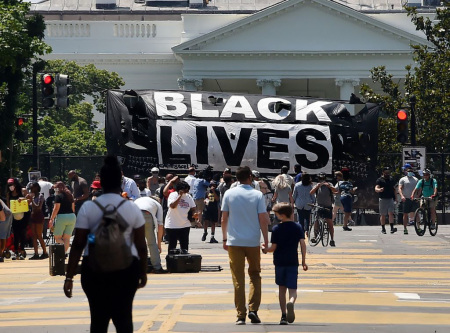Only 20% of Americans see racial inequality as important issue facing families, poll finds

While a majority of American families have discussed Black Lives Matter and police brutality in the wake of ongoing protests about racial inequality, only a minority of them, regardless of political affiliation, see it as an important issue, according to a recent poll.
The latest American Family Survey, released on Tuesday, was conducted between July 3 and July 14 for a partnership between the Deseret News and Brigham Young University’s Center for the Study of Elections and Democracy. The study explores several areas of family life, including relationships, economics, politics, health and culture.
The market research and data analytics firm YouGov interviewed 3,251 respondents who were then matched down to a sample of 3,000 to produce a final dataset reflective of a sampling frame based on gender, age, race and education. The sample has a margin of error of plus or minus 1.9%.
The survey found that on average, about three-quarters of Americans (73%) said they had talked about Black Lives Matter or police brutality with members of their family.
“It is clear that these events played an important role in family discussions in the United States in 2020,” researchers said in a summary of the findings. “Approximately three-quarters of both Republicans and Democrats said they had talked about issues of race with family members. Of those in relationships, nearly all of them had talked with their spouses or partners, but more than two-thirds of Republicans and Democrats had family discussions about these issues with their children too.”
Democrats were more likely than Republicans to extend the conversation to other family members like parents or siblings but the nature of the conversation and views on the issues differed by party affiliation.
Despite the high level of conversation generated over racial inequality, only 20% of Americans surveyed in a half sample (1,500 respondents) cite it as one of the important issues facing families when presented with a list of a dozen curated most important issue items and asked to select up to three.
Democrats, at 33%, were more likely to see it as an important issue while only 4% of Republicans felt the same.
About 15% of Independents cited it as a major concern for families.
When asked to agree, disagree or remain neutral on the statement “Black families in America face obstacles that white families don’t face,” most families agree. But the results show some of the largest gaps in the survey across the party lines.
Among all respondents, 56% agree with the statement, 20% reported a neutral response while 24% disagree.
About 80% of Democrats, in general, were found to agree with the statement even more than black respondents at 77%. Only 8% of Democrats and 9% of black Americans disagree with the statement
Just 25% of Republicans agree with the statement while 49% said they disagree with it. While a majority of Hispanics (55%) agree with the statement, 27% of respondents from this group said they are neutral and 18% disagree.
Hispanics reported the highest percentage of neutral responses to the statement.
“Our interpretation of these results is that white Democrats have embraced the cause of police brutality and violence against Black citizens, to some degree even more than have Black citizens themselves,” researchers noted.
“The broader public is less convinced of this cause, though there clearly is some level of agreement with it across most demographic groups Republicans, however, generally do not agree with that statement.”
A Pew Research Center survey released last month shows support for the Black Lives Matter movement among U.S. adults has dropped from 67% in June, amid nationwide demonstrations sparked by the death of George Floyd, to 55%. The share who say they strongly support the movement stands at 29%, down from 38% three months ago.






















